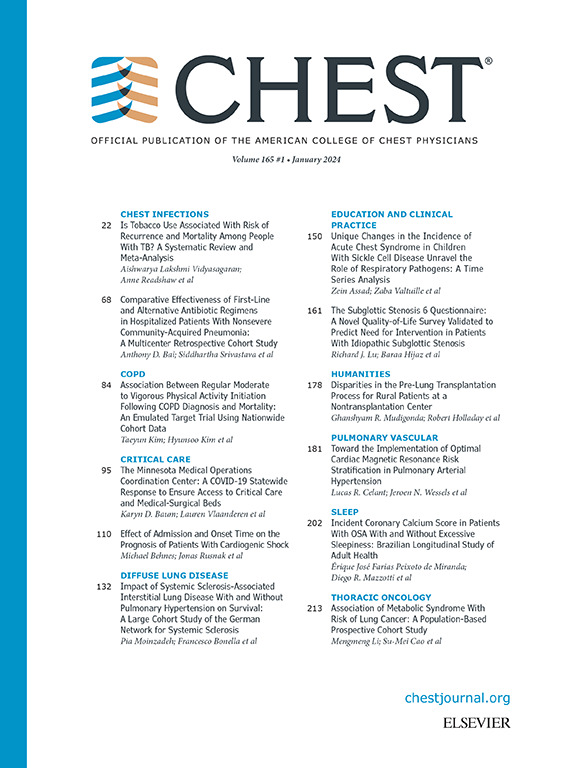Editing approaches to treat Alpha-1 Antitrypsin Deficiency (AATD).
IF 9.5
1区 医学
Q1 CRITICAL CARE MEDICINE
引用次数: 0
Abstract
TOPIC IMPORTANCE Alpha-1 antitrypsin (AAT) deficiency (AATD) is a genetic disorder most commonly due to a single G to A point mutation, leading to debilitating lung and/or liver disorders and is associated with increased mortality. The E342K point mutation causes a conformational change of the AAT protein resulting in its retention in liver hepatocytes. This reduces AAT secretion into the serum resulting in higher protease activities due to the lack of inhibition from AAT, causing damage to healthy lung tissue. The current standard of care for lung manifestations involves weekly intravenous augmentation therapy and is considered sub-optimal for these patients. Furthermore, there is currently no approved treatment for liver manifestations. The unmet medical need for AATD patients remains high and new treatment options are needed to treat the underlying disease etiology. REVIEW FINDINGS Advances in genomic medicines may enable treatment by editing the DNA or RNA sequence to produce wild-type AAT instead of the mutated AAT caused by the E342K mutation. One approach can be achieved by directing endogenous Adenosine Deaminases that act on RNA (ADARs) to the E342K RNA site, where they catalyze adenosine to inosine conversion through a process known as RNA editing. The A-I RNA change will be read as a G during protein translation, resulting in an altered amino acid and restoration of wild-type AAT secretion and function. SUMMARY In this review, we will discuss the pathophysiology of AATD and emerging treatment options with particular focus on RNA editing as a disnd have stock options in ease-modifying treatment for both liver and lung disease.编辑治疗阿尔法-1 抗胰蛋白酶缺乏症(AATD)的方法。
主题重要性α-1 抗胰蛋白酶(AAT)缺乏症(AATD)是一种遗传性疾病,最常见的原因是单个 G 到 A 点突变,会导致衰弱的肺部和/或肝脏疾病,并与死亡率增加有关。E342K 点突变会导致 AAT 蛋白构象发生变化,从而使其滞留在肝脏肝细胞中。这减少了 AAT 向血清的分泌,导致蛋白酶活性因缺乏 AAT 的抑制而升高,从而对健康的肺组织造成损害。目前治疗肺部表现的标准疗法包括每周一次的静脉注射增强疗法,但对这些患者来说,这种疗法并不理想。此外,目前还没有针对肝脏表现的治疗方法获得批准。回顾性研究发现,基因组药物的进步可能会通过编辑 DNA 或 RNA 序列来产生野生型 AAT,而不是 E342K 突变所导致的变异 AAT,从而实现治疗。其中一种方法是将作用于 RNA 的内源性腺苷脱氨酶(ADARs)导向 E342K RNA 位点,通过 RNA 编辑催化腺苷向肌苷的转化。在蛋白质翻译过程中,A-I RNA 的变化将被读作 G,从而导致氨基酸的改变,并恢复野生型 AAT 的分泌和功能。摘要在本综述中,我们将讨论 AATD 的病理生理学和新出现的治疗方案,并特别关注 RNA 编辑作为肝脏和肺部疾病的易变治疗方法。
本文章由计算机程序翻译,如有差异,请以英文原文为准。
求助全文
约1分钟内获得全文
求助全文
来源期刊

Chest
医学-呼吸系统
CiteScore
13.70
自引率
3.10%
发文量
3369
审稿时长
15 days
期刊介绍:
At CHEST, our mission is to revolutionize patient care through the collaboration of multidisciplinary clinicians in the fields of pulmonary, critical care, and sleep medicine. We achieve this by publishing cutting-edge clinical research that addresses current challenges and brings forth future advancements. To enhance understanding in a rapidly evolving field, CHEST also features review articles, commentaries, and facilitates discussions on emerging controversies. We place great emphasis on scientific rigor, employing a rigorous peer review process, and ensuring all accepted content is published online within two weeks.
 求助内容:
求助内容: 应助结果提醒方式:
应助结果提醒方式:


